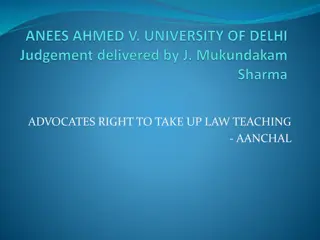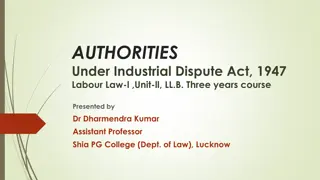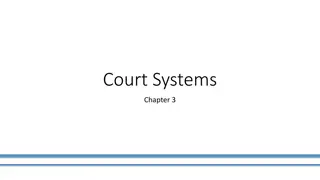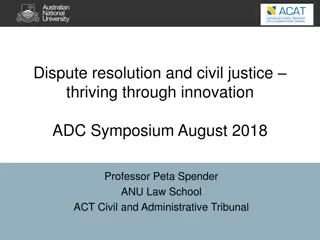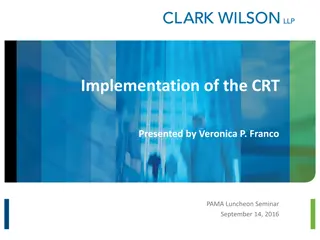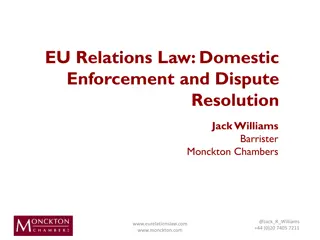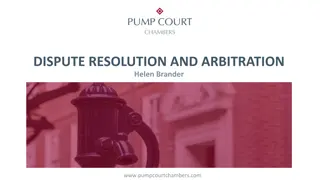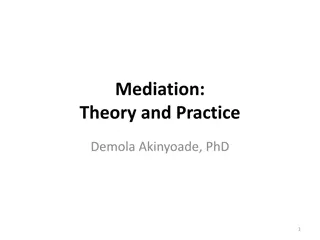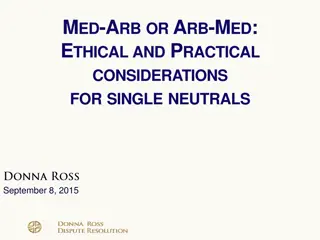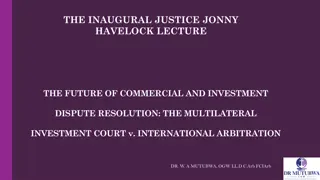Understanding Director Status and Alternative Dispute Resolution in Company Law
Significant changes were made to the Companies Act in 2008, impacting the status of directors. This includes the matter of de facto directors as seen in the Octavia Matshidiso Matloa v. Multichoice South Africa case. Past legislation and defective appointments are also discussed, along with provisions in the Companies Act of 2008 regarding director definitions and defective appointments.
Download Presentation

Please find below an Image/Link to download the presentation.
The content on the website is provided AS IS for your information and personal use only. It may not be sold, licensed, or shared on other websites without obtaining consent from the author. Download presentation by click this link. If you encounter any issues during the download, it is possible that the publisher has removed the file from their server.
E N D
Presentation Transcript
Director Status and Alternative Dispute Resolution Neels Kilian
INTRODUCTION Significant changes to the Companies Act 71 of 2008 were made by excluding relevant sections of the Companies Act 61 of 1973. Accordingly, before we focus on those sections not incorporated in the 2008 Act, the following unreported matter explains the present problem relevant to de facto directors. The facts of Octavia Multichoice South Africa problematic pertaining to the status of directors is there still room for de facto directors? Matshidiso were Matloa simple v and
OCTAVIA MATSHIDISO MATLOA V MULTICHOICE SOUTH AFRICA (Gauteng Division) (unreported) case number 40731/2019 of 6 February 2020 On 8 August 2018, after completing ten different interviews, Octavia received a written invitation to serve on the board of directors of Multichoice and to be officially appointed by the annual general meeting of shareholders on 30 August 2018 as required by the memorandum of incorporation of Multichoice. Multichoice communicated the termination of her position as director to the Companies Intellectual Property Commission (CIPC), termination as one of resignation, as CIPC has no tick- box to note "de facto appointed directors". The CIPC record allows only for the recording of "removal as a director" and or "resignation as a director". which noted the
PREVIOUS LEGISLATION AND DEFECTIVE APPOINTMENTS Companies Act 31 of 1909 ss 2 and 72 Companies Act 46 of 1926 ss 229 and 69 Companies Act 61 of 1973 ss 1 and 214 All the same Director definition Includes any person occupying the position of director or alternate director of a company,by whatever name he may be called. And The acts of a director or manager shall be valid notwithstanding any defect that may afterwards be discovered in his appointment.
COMPANIES ACT 61 OF 2008 AND DEFECTIVE APPOINTMENTS Section 1 of the Act and the definition for directors. Section 66(7) of the Act very unique wording: A person becomes entitled to serve as a director of a company when that person - (a) and (b) has delivered to the company a written consent to serve as its director. Still a de facto director in the 2008 Act? CIPC must make provision for resignation, removal or otherwise
COMPANIES BILL 2007 The 2008 Companies Act has a similar definition for directors, as compared to the 1909 Act, 1926 Act, 1973 Act but without a similar section 214 regulation in the 1973 Act relevant to defective appointments. Companies Bill 2007 in ss 1 and 89(5)(b): - A director is defined in section 1 as a member of the board of a company AND - A director is disqualified from acting as such if he or she has not given his or her consent to act as a director A section similar to section 214 was therefore not required in the 2007 Bill, since a de facto could not exist.
CONTINUE In this regard the actions or decisions or votes cast during board meetings by disqualified or ineligible directors are invalid in the 2007 Bill. Actions of votes acts in the 2008 Act, where a director was not entitled to act as such? Answer is complex: 1. CIPC may issue a compliance notice in the prescribed form to either the company or the director, stating that the Commission reasonably believes that section 66(7) has been contravened. A compliance notice may require either the company or the director to comply with section 66(7) or to reverse any board decision or vote cast by the director or to rectify those actions. In this regard, the director and the decisions or votes cast by such a director could be valid when complying with a compliance notice as regulated by section171(2) OR
CONTINUE 2. The Commission may also refer the matter to the Companies Tribunal for consideration. On the other hand, the Commission will approach the Tribunal only if it considers that non-compliance would be resolved more expeditiously. - Accordingly, provided no complaints were received or no investigations were conducted, what will happen to those board decisions or votes cast by a director who was appointed defectively? Tribunal should be allowed to investigate these board decisions.
OPTIONS FOR COMPANIES TRIBUNAL a) Entitled could be a condition (suspensive or resolutive) Private Security Regulatory Authority v Commission for Conciliation Mediation and Arbitration 2012 33 ILJ 961 (LC) - section 14(4)(c) of the Private Regulation Act 56 of 2001, which provides that all persons, including directors, working for a security company must undergo a security clearance check contract. Security Industry terminate employment
OPTIONS CONTINUE b) Ratification ? The problem is whether section 66(7) makes provision for ratification. Section 66(7) is clear that a person can act as a director or, in other words, is entitled to serve as such when he or she has, for instance, provided written consent to the company to act as a director. c) Estoppel ? However, the relationship between estoppel and section 66(1) is unclear, since section 66(1) requires compliance with the 2008 Act.
CONCLUSION - NEITHER DE FACTO NOR DE JURE? Deputy Commissioner of Taxation v Austin (1998) 28 ACSR 56 in Australia period shorter than 17 April to 21 June is not considered to act as a director. To act as gestor in times of emergency ? Tribunal should be able to decide?



